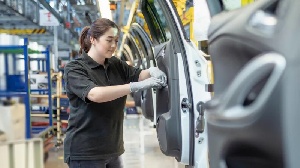- Home - News
- Elections 2024
- News Archive
- Crime & Punishment
- Politics
- Regional
- Editorial
- Health
- Ghanaians Abroad
- Tabloid
- Africa
- Religion
- Photo Archives
- Press Release
General News of Monday, 7 April 2025
Source: www.ghanawebbers.com
UK to relax electric car rules as US tariffs hit
The government has relaxed electric vehicle (EV) sales targets. This change aims to support the car industry amid US trade tariffs.
A ban on new petrol and diesel cars will still start in 2030. However, manufacturers now have more flexibility with annual targets. They will also face lower fines for not meeting these targets.
Transport Secretary Heidi Alexander spoke on BBC Breakfast. She said these changes are not a "silver bullet." They are part of the solution to address US tariffs.
UK opposition parties criticized Labour's measures as insufficient for the car industry. US President Donald Trump imposed a 25% levy on imported cars last week. This tariff affects the UK motor industry significantly.
The 25% tariff is separate from a 10% tax on UK products announced by Trump. A consultation on EV target changes ended in mid-February. Alexander stated that the government expedited these changes due to tariffs.
The government collaborated with UK car manufacturers on this issue. They aim to strengthen their commitment to phasing out petrol and diesel vehicles while supporting the industry.
Currently, 28% of new cars sold in the UK must be electric this year. This target will increase each year until 2030. Manufacturers now have more freedom in how they meet yearly targets.
If they fall short one year, they can compensate by selling more EVs the next year. Additionally, fines for non-compliance will decrease from £15,000 to £12,000 per vehicle.
A ban on hybrid vehicle sales will begin in 2035. Smaller firms like Aston Martin and McLaren can continue making petrol cars beyond 2030.
As part of these changes, the car industry will receive £2.3 billion in tax breaks. The previous Conservative government extended the ban on petrol and diesel cars to 2035.
Labour promised to restore the original 2030 deadline in its manifesto for the upcoming election. Car industry leaders warn that drivers are not switching to EVs quickly enough due to high costs and limited charging infrastructure.
Sir Keir Starmer stated that these measures would boost growth for working people and help home-grown firms export cars worldwide. However, Robert Forrester from Vertu Motors expressed skepticism about the announcement's effectiveness.
He noted that manufacturers would still incur significant fines despite reductions per car sold. Forrester described the government's approach as "tinkering" rather than substantial change.
Shadow business secretary Andrew Griffith called these measures "half baked." He echoed Conservative leader Kemi Badenoch's claim that achieving net zero by 2050 is impossible.
Liberal Democrat transport spokesperson urged better incentives for consumers buying electric vehicles. They believe current changes won't protect the sector from Trump's damaging tariffs.
The US is the second-largest export market for UK's car industry after the EU. Coventry-based Jaguar Land Rover announced it would pause all shipments to the US in April due to new trading terms.
A separate 10% tariff on UK imports began over the weekend, with higher rates affecting other major economies as well.











